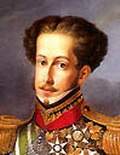Dom Pedro de Alcantara was born in the family of Joao (later King Joao VI), prince regent of Portugal, who was forced to take his court and the 9-year-old son to Brazil (1807-1808) after Napoléon I completed the conquest of Portugal. When Joao VI, who succeeded his mother, Maria I, in 1816, decided to return to Portugal, he announced his intention to make Pedro regent (7 Mar 1821). Before his departure (26 Apr 1821), Joao appointed Pedro Prince Regent and Lieutenant in the Government of the Kingdom of Brazil [1] (22 Apr 1821) to rule the country in king's absence. Pedro was prevented from returning to Europe by political groups interested in independence from Portugal. Surrounded by adherents of Brazilian independence, Pedro, when confronted with a resolution of the Portuguese Cortes recalling him and putting Brazil under direct rule (1822), resolutely refused, with the lapidary statement fico ("I stay"). In response to popular demand, Pedro convened a Constituent Assembly and solemnly proclaimed the independence of Brazil on the plain of Ipiranga, near the city of Sao Paulo on 7 Sep 1822. The authority of Joao VI as king of Brazil continued to be vaguely maintained, but on 21 Sep 1822 the Brazilian Senate proclaimed Pedro Constitutional Emperor of Brazil. He accepted the title at the inauguration ceremony held in Santana field outside Rio de Janeiro (12 Oct 1822) and was crowned (1 Dec 1822). The General Constituent Assembly was convened (3 Jun 1823) to draft the first imperial constitution, but the liberal wing of its deputies opposed the concept of strong monarchy espoused by the emperor. He dissolved that body (11/12 Nov 1823) and exiled some radical leaders. Pedro instructed the Council of State to prepare a moderate constitution, which was finally promulgated by imperial decree on 25 Mar 1824. In 1825 Pedro reached reconciliation with Portugal and his father, Joao VI, who elevated Brazil to the rank of empire reserving for himself a nominal title of Emperor of Brazil (13 May 1825). The treaty between Portugal and Brazil settling the process of recognition of the new empire was concluded on 29 Aug 1825 and promulgated in Rio de Janeiro by a decree of Pedro I on 10 Apr 1826. Pedro succeeded to the throne of Portugal, which became vacant upon the death of Joao VI at Lisbon (10 Mar 1826; Pedro informed 22 Apr 1826) [2], but later conditionally abdicated (2 May 1826; effective 3 Mar 1828) in favor of his daughter, Maria da Gloria. In the second half of 1820s Pedro's authoritarian rule estranged Brazilian political elite. A lack of responsible government, separatist movements and a stalemate in the war with the United Provinces of the Rio de la Plata over the territory of modern Uruguay created a strong opposition to the imperial government in the General Assembly convoked in 1826. Pedro abdicated the thrones of Portugal and Algarves (effectively 3 Mar 1828) and chose returning to Europe to install Maria da Gloria as queen of Portugal in place of his rebellious brother, Miguel, who usurped the throne in July 1828. The emperor abdicated on 7 Apr 1831; his instrument of abdication was read to the General Assembly, in session on that day. He succeeded in expelling Miguel (1834) and died after serving as regent for Maria from 2 Feb 1832 to 18 Sep 1834. [3]
|

